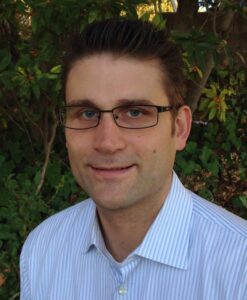
Gahlmann, Andreas
Primary Appointment
Associate Professor, Chemistry
Education
- BA,BS, Chemistry, University of Portland
- PhD, Physical Chemistry, California Institute of Technology
- Postdoc, Biophysical Chemistry, Stanford University
Contact Information
Dept. of Chemistry, Chemistry 129
409 McCormick Rd.
Charlottesville, Virginia 22904
Telephone: 4349243624
Email: ag5vu@virginia.edu
Website: http://www.gahlmannlab.com/
Research Disciplines
Biochemistry, Biophysics, Biophysics & Structural Biology, Biotechnology, Chemistry, Infectious Diseases/Biodefense, Microbiology, Molecular Biology
Research Interests
Super-resolution fluorescence imaging of bacterial cells
Research Description
We develop nanoscale imaging methods for 3D single-molecule localization in intact bacterial cells. Our two primary research objectives are: 1. Development of 3D super-resolution imaging methods, including instrument design, sample preparation, and computational image analysis. 2. Application of these methods to understand molecular-level spatial and temporal phenomena inside intact bacterial cells and cellular-level interactions within developing microbial communities. To achieve these objectives, we operate in a multidisciplinary research environment that integrates aspects from several areas of chemistry, molecular and cellular biology, as well as biophysics, optical physics, engineering, and computer science. Our experiments access the molecular (nanometers) length scales that are inaccessible with conventional diffraction-limited fluorescence microscopy and bridge to the cellular (micrometers), and intercellular (10-100 micrometers) length scales. Utilizing the single-molecule sensitivity and specificity of super-resolution fluorescence microscopy, we can localize single biomolecules or single cells in 3D space and track their motion over time. Wherever possible, we primarily perform imaging experiments with living cells to characterize how molecular- or cellular-level spatial and temporal phenomena determine the physiology and phenotype of the cell or the functionalities of entire cell populations. Projects in the lab address a variety of biological processes with direct relevance to bacterial pathogenesis and biotechnological applications.
